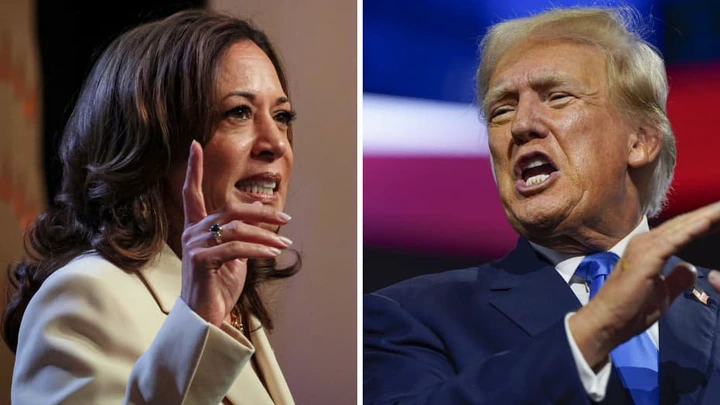For months, and more intensely now that the US Presidential election is down to its final weeks, the contest between Vice President Kamala Harris, a daughter of immigrant parents vying for the seat under the Democratic Party, and Donald Trump, who is seeking to make a comeback to the White House under his Republican Party, has elicited diverse views among African Americans. ...Tap To Read The Full Story Here | ..Tap To Read The Full Story Here...
Interestingly, and understandably, the election has also drawn increased attention from their kin in Africa, partly due to the unprecedented circumstances surrounding the election—from President Joe Biden’s unexpected step down to the double assassination attempt on Trump live.
It’s a hot contest that deserves attention. By many measures, it is one of the most fiercely competitive presidential elections in US history, with both candidates neck-and-neck in pre-election polls. Americans appear increasingly indecisive on whom to elect.
A few months back, before Biden’s sudden step down, the Republican Party led in pre-election polls. Things changed swiftly after Harris entered the race, and the Democratic Party overtook the Republicans. However, according to the latest forecast by The Economist, Trump now has a 54 percent chance of returning to the White House. Yet, the race remains tight, with the same forecast predicting that Harris has a 74 percent chance of winning the popular vote—though this does not guarantee victory, given the US electoral college system.
As November 5th approaches, both Trump and Harris have intensified their campaigns, wooing voters of all backgrounds, including people of colour, particularly African Americans.
In a race expected to be close, securing the Black vote—which, according to Pew Research, will account for 14 percent of the electorate—could determine the outcome.
Harris, a Black woman, has an advantage, with a poll showing she has the support of 78 percent of Black voters. However, this is a decline from the 90 percent support that Democrats received in recent elections in the country.
Why this apparent shift in Black support from the Democratic Party to the Republicans? And should Africans in Africa have a preferred candidate?
To many Africans in Africa, who have their own pressing issues, the occupant of the White House seems of little consequence—Trump’s election would not ease Nigeria’s soaring cost of living, nor would Harris’ win end the war in Sudan.
Yet, America’s leadership matters. It could mean more or less aid to Africa, increased or decreased trade partnerships, or a shift in immigration policies.
Before delving into how the policies of both parties affect Africa, it’s essential to explore how African Americans have fared under different administrations.
New CNN Poll Cannot Differentiate Between Harris and_Trump
How Blacks Shifted From Voting Republican To Democratic Party
Abraham Lincoln, a Republican President, is not only known for leading America through the Civil War of 1861–1865, but is regarded as the central figure in the liberation of Blacks from slavery in America.
Born into a poor family in Kentucky, the self-educated man entered politics, rose through the ranks, pushing against the expansion of slavery in new US territories, and was elected President in 1860.
In 1863, Lincoln issued the Emancipation Proclamation, declaring freedom for enslaved people in Confederate-held territories. Although it didn’t immediately free all slaves, it was a crucial step toward abolition and gave the Union Army a moral purpose, allowing Black soldiers to join its ranks.
From there onwards, after the Civil War and the assassination of Lincoln, Blacks became emotionally vested in the Republican Party.
At that time, the Republican Party, now operating under the political ideologies of conservatism, was regarded largely as liberal. Hence, during the Reconstruction Era, a period in American history dominated by legal, social, and political changes that emerged due to the abolition of slavery, the liberal-leaning Republican Party pushed for the 15th Amendment. The 15th Amendment was a crucial liberation bill that stated that citizens (only male) could not be denied the right to vote due to “race, colour, or previous condition of servitude.”
Since 144 Republican lawmakers in the House of Representatives and 33 Senators supported the amendment—while none from the Democratic Party in both chambers did—it was unsurprising that Blacks backed Ulysses S. Grant in the November 5, 1868, presidential election.
While it could be argued that the Republican Party handed Blacks their freedom from slavery, voter discrimination continued well into the 1960s until the establishment of the Voting Rights Act of 1965. However, some argue that Blacks found a sense of economic power under Democratic governments.
The shift toward the Democratic Party by Blacks began during the Great Depression (1929–1939), a period of significant economic crisis. The Depression started with the stock market crash on October 29, 1929—often referred to as Black Tuesday—and led to widespread unemployment, poverty, and a significant contraction in global trade and industrial activity. Blacks in America, already at a disadvantage, suffered greatly.
Franklin D. Roosevelt, a Democrat, ran for President with policies aimed at alleviating economic suffering. Interestingly, he was backed by prominent Blacks, including Robert L. Vann, editor of the influential Black newspaper The Pittsburgh Courier, who urged his brethren, “Emancipate yourself from blind allegiance to the Republican Party.”
Roosevelt won the 1932 presidential election by a landslide and introduced reforms—such as the Agricultural Adjustment Act (AAA), the Civilian Conservation Corps (CCC), and the National Industrial Recovery Act (NIRA)—that impacted several Black communities. One publication noted that not only did Roosevelt implement non-discriminatory policies, but he also appointed more African Americans to federal positions than all previous Republican administrations combined.
In his second bid for office in 1936, Roosevelt won three-fourths of African American votes.
From then onward, and more notably after the Civil Rights Movement of 1964, Black voters consistently leaned toward the Democratic Party, with some elections—like Barack Obama’s in 2008—seeing over 90 percent of Black voters supporting the Democratic candidate.
Since the Democratic Party is now known for advocating policies aimed at reducing inequality—such as expanded child tax credits, minimum wage increases, and student debt forgiveness—some reports show that Black Americans fare better under Democratic administrations.
According to a report by the Scholars Strategy Network, Black families’ incomes grew by an average of $895 annually under Democratic presidents, compared to only $142 under Republicans.
The report adds: “The Black unemployment rate fell by a net 7.9 percentage points across the 26 years of Democratic leadership, but went up by a net 13.7 points during 28 years of Republican presidencies.”
Additionally, during the same period, “under Democratic leadership, Black poverty declined by a net of 23.6 percentage points but grew by three points when Republicans held the White House.”
From a Cordial Handshake to Personal Attacks: An Analysis of the Trump vs. Harris Debate
How Much Will Africa Benefit If Trump or Harris Rule America?
Away from how a Republican or Democratic President affects the lives of Black Americans, the lingering question is: What benefits does a US government offer the African continent?
The prevailing opinion, understandably, is that it matters but little. For the 28 years the GOP has held power and the 36 years Democrats have ruled, Africa’s plights—from poverty to wars—have persisted.
In reality, the challenges Africa faces today cannot be resolved by foreign governments alone; they require carefully thought-out indigenous solutions. However, partnerships with economically positioned countries—such as the US—are still crucial.
According to African Business, Africa—a continent of over 1.4 billion people—accounts for less than 2 percent of total US merchandise exports and imports.
Between 2011 and 2021, the value of US exports to the continent fell from $32.9 billion to $26.7 billion. Additionally, imports declined from $93 billion to $37.6 billion within that period.
However, in the shorter period that overlaps with the Biden-Harris administration, total trade between the US and sub-Saharan Africa increased by 6.2 percent, from $44.7 billion in 2021 to $47.5 billion in 2023, according to the newly released African Growth and Opportunity Act (AGOA) Report. Conversely, during Trump’s tenure, total two-way trade with sub-Saharan Africa declined by 5.7 percent—from $38.9 billion in 2017 to $36.7 billion in 2019.
Additionally, while the US remains Africa’s largest aid donor, a Trump presidency might lead to further withdrawal of aid in line with his America First policy, which aims to reduce foreign aid.
Alex Vines, of the UK-based think tank Chatham House, noted that Trump’s vision is more transactional compared to the Democrats’ philanthropic approach.
“His vision is very transactional—it’s in a way very neo-colonial,” said Vines. “So the first question that a Trump administration would ask could be: What’s our gain? Which is very different from the kind of philanthropic response you would get from Democrats.”
But his presidency, given his pro-cryptocurrency stance, might have a more favorable view of digital assets like Bitcoin and other cryptocurrencies, which many African youths have largely adopted and leveraged as a means of income.
Beyond economics—whether through aid or trade partnerships—US policies also affect African countries in areas such as immigration, military cooperation, and human rights.
For example, between 2017 and the end of Trump’s tenure, US troop levels in Africa fell from over 5,000 troops to around 1,300. Meanwhile, the Biden administration stripped Uganda of AGOA eligibility due to its anti-LGBTQ legislation.
At least 30 out of 54 African countries have some form of anti-gay laws. As a Democrat, a Harris administration is more likely to impose economic sanctions on these countries than a Trump administration.
DNC: Kamala Harris Slams Trump on Abortion and His Autocratic Ambitions
In all, while the party occupying the White House may not erase the challenges Africa faces, a Harris or Trump administration could determine whether Africa is treated as a worthy partner or further relegated to the sidelines.. ..ALSO READ FULL FROM SOURCE ↔️



